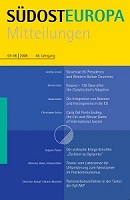Religion und Nationswerdung: Das Beispiel der Bosniaken (Muslime), Kroaten und Serben in Bosnien-Herzegowina
Religion and Nation Building: The Case of the Bosniacs (Muslims), Croats and Serbs in Bosnia and Herzegovina
Author(s): Ludwig SteindorffSubject(s): Politics / Political Sciences
Published by: Südosteuropa Gesellschaft e.V.
Summary/Abstract: In a process from the middle of the 19th until the middle of the 20th century the large traditional religious groups of the Ottoman period in Bosnia and Herzegovina – Muslims, Catholics and Orthodox – were transformed into communities which were defined as nations without changing their size. The delimitation of the confessions became the national one as well. As elsewhere in East Central and South Eastern Europe the sacred has increasingly been „nationalized“ since the 1980s. The Bosnian war 1992-1995 certainly was not a religious war, but a war for religious symbols which were interpreted as national symbols. At present, numerous newly erected sacral buildings serve to symbolize the own nation as well. The different and controverse visions of national history are one of the obstacles to the successful integration of the contemporary state. Despite all difficulties it should be a goal of European policy to maintain and to stabilize the state of Bosnia and Herzegovina. People should learn that the affirmation of different religions respectively nations on the one hand and the regional identity and loyalty to the common state on the other hand don't exclude each other.
Journal: Südosteuropa Mitteilungen
- Issue Year: 2007
- Issue No: 05-06
- Page Range: 102-113
- Page Count: 12
- Language: German
- Content File-PDF

